Squatting is increasingly common across the country. Squatting occurs when someone occupies someone else’s property without the owner’s permission and intends to stay there. Squatters can sometimes take formal legal possession of property against the valid owner’s will through what the law calls adverse possession. Here’s a primer on the applicable legal principles and how to protect yourself.
Origins of squatters’ rights
The law pertaining to squatting arose in the 1800s as pioneers moved westward and staked claim to unoccupied land. The federal Homestead Act of 1862 granted settlers the legal right to claim land in this way. All 50 states still have similar laws. They allow squatters to move into vacant property on vacant land and, by meeting specific legal criteria, claim ownership or the right to stay as a tenant.
How squatting can occur
Most often, squatters take over a long-vacant house whose actual owner is inattentive. To take adverse possession of the property, squatters are required by every state to occupy the property for a minimum number of years, pay the property taxes for a minimum number of years, or both. The squatter must intend to remain in the property. Often, the squatter can show he has taken actions consistent with ownership, such as holding the property deed, continuously occupying the property, paying utility bills, and/or making repairs and improvements.
Squatter’s rights laws are complex and vary by state. If you find squatters have occupied your property, you must follow legal requirements to remove them. Do not take direct action yourself. Instead, find an attorney who works in property law to help you.
Occupancy after lease expiration
Sometimes, after a lease expires, a tenant remains on the property. Whether this is squatting depends on the circumstances and the relevant state law. If the property owner doesn’t tell the tenant to leave and takes no action to make that happen, the law protects the tenant. But where the tenant refuses the landlord’s request to leave, the tenant becomes a squatter.
Whenever an authentic lease expires, the owner must clarify in writing to the tenant whether they will be offered a new lease, are allowed to stay on month to month, or are expected to vacate. If the tenant refuses to leave after clear written notice to do so, the owner must file a civil action with a court to evict.
In every state, tenants have rights that the owner-landlord must respect. Owners must follow the law to prove that an occupant is a squatter rather than a lawful tenant.
Squatting versus trespassing
A trespasser is someone who knowingly enters someone else’s property without permission. Squatting is a civil matter, but trespassing is criminal so police can remove or arrest a trespasser. Some trespassers may be squatters, but not all squatters are trespassers. A person who remains after her lease has expired, has failed to make lease payments, or has violated her lease in some other way is not a trespasser.
Protect yourself from squatters
- Pay attention to your vacant residential or commercial property so that you become aware of squatters before they stay long enough to obtain legal rights. Serve written notice to vacate as soon as a squatter has taken occupancy.
- Pay property taxes on time, every time. Squatters sometimes can take adverse possession of property by paying taxes on it for several years.
- Keep property secured. In some states, squatters gain a legal advantage if they have reason to believe they are allowed on the property. Post “no trespassing” signs and install burglar alarms on unoccupied property.
- Always have an explicit written agreement with those who lease your property. Oral leases are more challenging to enforce. When a lease expires, make clear in writing whether you wish to extend it or want the tenant to move out.
Related – Be Certain the Law is On Your Side When Evicting a Tenant


